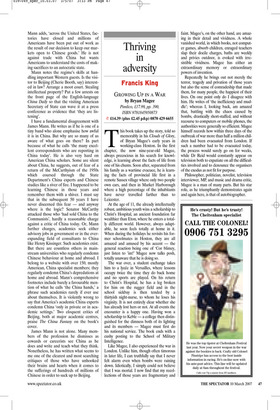Thriving in adversity
Francis King
GROWING UP IN A WAR by Bryan Magee Pimlico, £17.99, pp. 390, ISBN 9781845950873 ✆ £14.39 (plus £2.45 p&p) 0870 429 6655 This book takes up the story, told so memorably in his Clouds of Glory, of Bryan Magee’s early years in working-class Hoxton. In the first chapter, the now nine-year-old Magee, always precocious in his search for knowledge, is learning about the facts of life from one of his chums. Soon after, separated from his family as a wartime evacuee, he is learning the facts of provincial life first in a remote Sussex village where only two people own cars, and then in Market Harborough where a high percentage of the inhabitants have never travelled farther than to Leicester.
At the age of 11, the already intellectually robust, ambitious youth wins a scholarship to Christ’s Hospital, an ancient foundation far wealthier than Eton, where he enters a totally different world. However, always adaptable, he soon feels totally at home in it. When during the holidays he revisits his former schoolmates in Hoxton, they are all amazed and amused by his accent — the general reaction being one of ‘Cor blimey, just listen to ’im!’ Magee now talks posh, totally unaware that he is doing so.
The war over, a student exchange takes him to a lycée in Versailles, where lessons occupy twice the time they do back home and no sports are played. On his return to Christ’s Hospital, he has a leg broken for him on the rugger field and in the school sickbay is then tended by a thirtyish night-nurse, to whom he loses his virginity. It is not entirely clear whether she has already lost hers or not. At all events the encounter is a happy one. Having won a scholarship to Keble — a college then distinguished for the dimness both of its lighting and its members — Magee must first do his national service. The book ends with a cushy posting to the School of Military Intelligence.
Like Magee, I also experienced the war in London. Unlike him, though often timorous in later life, I can truthfully say that I never felt alarm even when bombs were raining down. Idiotically, I simply could not believe that I was mortal. I now find that my recollections of those years are fragmentary and faint. Magee’s, on the other hand, are amazing in their detail and vividness. A whole vanished world, in which books, not computer games, absorb children, enraged teachers slap their docile charges, baths are weekly and privies outdoor, is evoked with irresistible vividness. Magee has either an extraordinary memory or extraordinary powers of invention.
Repeatedly he brings out not merely the terror, tragedy and privation of those years but also the sense of comradeship that made them, for many people, the happiest of their lives. On one point only do I disagree with him. He writes of ‘the inefficiency and muddle’; whereas I, looking back, am amazed that, battling with the chaos caused by bombs, drastically short-staffed, and without recourse to computers or mobile phones, the authorities were generally so efficient. Magee himself records how within three days of the outbreak of war more than half a million children had been evacuated from London. If such a number had to be evacuated today, the process would surely go on for weeks, while Dr Reid would constantly appear on television both to expatiate on all the difficulties involved and to denounce the organisers of the exodus as not fit for purpose.
Philosopher, politician, novelist, television interviewer, MP, and music and drama critic, Magee is a man of many parts. But his star role, as he triumphantly demonstrates again and again here, is that of autobiographer.


























































































 Previous page
Previous page